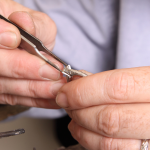In our previous blog post, we were examining historical moments in gold prices – citing the specific example of the Civil War Gold Hoax. In 1864, an unknown party tricked two New York City newspapers into printing a false story that President Lincoln planned to conscript 400,000 soldiers for the Union army. Fearing that the Union would lose the Civil War, investors increased their demand for gold, which hurt the stock market and increased gold prices by 10%.
The editors for the two newspapers had no ill intentions when they published the phony story. When skeptics first began questioning the facts of the report, they produced official dispatches from the Associated Press. In fact, many newspapers throughout the country had received the same dispatch. However, it was a clever forgery delivered via courier in the middle of the night. When the news outlets received the dispatch at those odd hours, they were faced with a decision: include this information in the morning paper, or hold it until it could be completely verified and elaborated. Since they were unable to get official confirmation of the truth, and because most other papers had not received the dispatch at all, most newspapers didn’t print anything. That is, except for New York World and the New York Journal of Commerce.
President Lincoln took swift and brutal action by shutting down both newspapers and arresting the editors for each, although they were later released. Detectives soon arrested the real perpetrator – an editor for the Brooklyn Eagle named Joseph Howard, Jr. On the day before his hoax, Howard had bought a bunch of gold on margin. He knew that any negative press about the Civil War would cause the price of gold to increase, so he forged an AP dispatch and sent it out to various city newspapers. Once the markets made the shift, he sold all his gold for a big profit.
Howard went to prison for the Civil War Gold Hoax, but only for a surprisingly short time. After less than three months, Lincoln himself ordered Howard’s release. Many historians believe that Lincoln’s leniency came from the fact that, two months after the gold hoax, he made the request (for real this time) for 500,000 more soldiers for the Union army (100,000 more than what was reported in the hoax).









